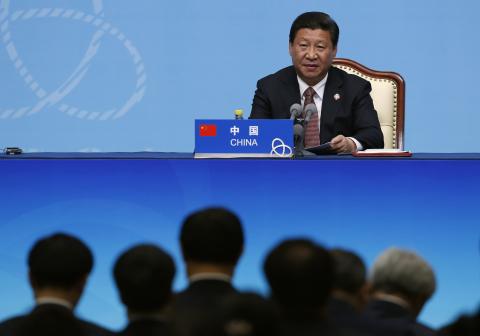Advertisement
China's Xi Vows To Address Poverty, Ethnic Unity In Troubled Xinjiang
BEIJING (Reuters) - Chinese President Xi Jinping has pledged to alleviate poverty and improve ethnic unity in restive Xinjiang, the most direct indication yet that China's leaders want to address the causes of violence in the remote western region.
Xi's comments, made in a speech to Communist Party leaders on Thursday and quoted heavily in Chinese media again on Friday, came after five suicide bombers killed 39 people and wounded 94 in an attack on a vegetable market in the Xinjiang capital, Urumqi, last week, the deadliest such incident in years.
Experts have long said economic marginalization of Xinjiang's large Muslim Uighur ethnic group is one of the main causes of the violence. However, until now, China's leadership had not openly expressed an intention to address the poor economic conditions faced by Xinjiang's Uighurs.
Xi said "the most long-term problem in Xinjiang is still one of ethnic unity", and that investment in the region must be increased to alleviate poverty.
"We must emphasize absorbing local labor and encourage Xinjiang people to work in the region," he said, in a reference to Uighur workers.
"Employment must be made a priority. Authorities need to help people find employment in the cities as well as find jobs and set up their own businesses near their homes," the official English-language China Daily quoted Xi as saying.
Xinjiang, resource-rich and strategically located on the borders of central Asia, is crucial to China's growing energy needs. Analysts say that, despite its mineral wealth and billions of dollars of investment, much of the proceeds have gone to majority Han Chinese, stoking resentment among Uighurs.
Rights groups also complain that Uighurs - who speak a Turkic language - are cut off from economic development because they face hiring discrimination, with jobs going to an influx of migrant workers from other parts of China.
A BIGGER SHARE
The official China Securities Journal reported on Friday that Xinjiang will be allowed to open up its oil and gas sector to private investment in an effort to give it a bigger share of energy profits. Xinjiang firms will also be able to participate in upstream exploration and development, an area traditionally limited to China's state-owned energy giants.
It said three large oil and gas blocks would be put up for tender for Xinjiang companies to make bids.
Xi also said funding for education must be expanded and that China would push forward bilingual education. "The fruits of Xinjiang's development must be used to improve people's livelihoods," he said.
"Law-abiding" worshippers must be protected even as the ruling Communist Party cracks down on extremists, Xi said, but teachings by religious leaders must also be grounded in patriotism.
Uighurs have long chafed at restrictions on their language and culture. Authorities restrict religious worship heavily in Xinjiang as well as the right to assembly, among other freedoms.
Beijing has vowed to crack down on religious extremists and separatist groups, which it blames for a series of violent attacks in Xinjiang and elsewhere.
Officials in Xinjiang held a public rally for the mass sentencing of 55 people in a stadium on Wednesday, meting out at least three death sentences for crimes such as "violent terrorism".
Party leaders say a group called the East Turkestan Islamic Movement (ETIM), which they say is seeking to form its own state called East Turkestan, is the most serious national security risk facing China. Experts dispute its influence and reach.
Vice Foreign Minister Zhang Ming told reporters on Friday that, like many Arab states, China faces the threat of violent extremism and vowed to continue counter-terrorism coordination with Middle Eastern countries.
He said the ETIM presents a "direct and realistic threat".
(Additional reporting by Li Hui, Michael Martina and David Stanway; Editing by Paul Tait)



















Add new comment